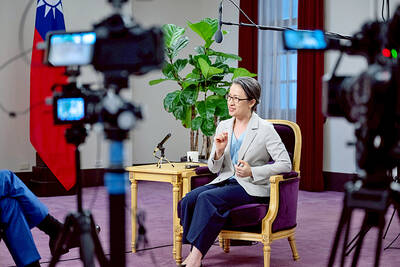Monthly rebates for frequent travel on the Taipei MRT are to be reduced from 10 to 30 percent to 5 to 15 percent from next month, Taipei Rapid Transit Corp said today in a news release.
The cashback would be reduced by up to NT$2 per return trip for commuters who take more than 50 rides per month, it said.
Senior and concession EasyCards, including children and the disabled, and the NT$1,200 monthly TPASS would not be affected, it added.

Photo: Tsai Ssu-pei, Taipei Times
Under the financial pressures of rising electricity fees, increased wages and the national minimum wage increase, Taipei Metro is expected to report a net loss for the first time this year, the company said.
Instead of increasing ticket prices, the frequent passenger program has been readjusted to cover expenses, it said.
Under the changes to go into effect on March 1, passengers would receive a 5 percent cashback after 11 to 20 rides in a single month, 10 percent after 21 to 40 rides and 15 percent for more than 40 rides, which would be credited to their transit cards on the first day of the following month, it said.
For passengers whose monthly transportation costs exceed NT$1,200, Taipei Metro recommended purchasing a TPASS card, which offers unlimited rides for 30 days within Taipei, New Taipei City, Keelung and Taoyuan.
TPASS includes rides on the MRT, Taiwan Railways, intercity and city buses and light rails, as well as YouBike rentals.

China might accelerate its strategic actions toward Taiwan, the South China Sea and across the first island chain, after the US officially entered a military conflict with Iran, as Beijing would perceive Washington as incapable of fighting a two-front war, a military expert said yesterday. The US’ ongoing conflict with Iran is not merely an act of retaliation or a “delaying tactic,” but a strategic military campaign aimed at dismantling Tehran’s nuclear capabilities and reshaping the regional order in the Middle East, said National Defense University distinguished adjunct lecturer Holmes Liao (廖宏祥), former McDonnell Douglas Aerospace representative in Taiwan. If

TO BE APPEALED: The environment ministry said coal reduction goals had to be reached within two months, which was against the principle of legitimate expectation The Taipei High Administrative Court on Thursday ruled in favor of the Taichung Environmental Protection Bureau in its administrative litigation against the Ministry of Environment for the rescission of a NT$18 million fine (US$609,570) imposed by the bureau on the Taichung Power Plant in 2019 for alleged excess coal power generation. The bureau in November 2019 revised what it said was a “slip of the pen” in the text of the operating permit granted to the plant — which is run by Taiwan Power Co (Taipower) — in October 2017. The permit originally read: “reduce coal use by 40 percent from Jan.

‘SPEY’ REACTION: Beijing said its Eastern Theater Command ‘organized troops to monitor and guard the entire process’ of a Taiwan Strait transit China sent 74 warplanes toward Taiwan between late Thursday and early yesterday, 61 of which crossed the median line in the Taiwan Strait. It was not clear why so many planes were scrambled, said the Ministry of National Defense, which tabulated the flights. The aircraft were sent in two separate tranches, the ministry said. The Ministry of Foreign Affairs on Thursday “confirmed and welcomed” a transit by the British Royal Navy’s HMS Spey, a River-class offshore patrol vessel, through the Taiwan Strait a day earlier. The ship’s transit “once again [reaffirmed the Strait’s] status as international waters,” the foreign ministry said. “Such transits by

Taiwan is doing everything it can to prevent a military conflict with China, including building up asymmetric defense capabilities and fortifying public resilience, Vice President Hsiao Bi-khim (蕭美琴) said in a recent interview. “Everything we are doing is to prevent a conflict from happening, whether it is 2027 or before that or beyond that,” Hsiao told American podcaster Shawn Ryan of the Shawn Ryan Show. She was referring to a timeline cited by several US military and intelligence officials, who said Chinese President Xi Jinping (習近平) had instructed the Chinese People’s Liberation Army to be ready to take military action against Taiwan